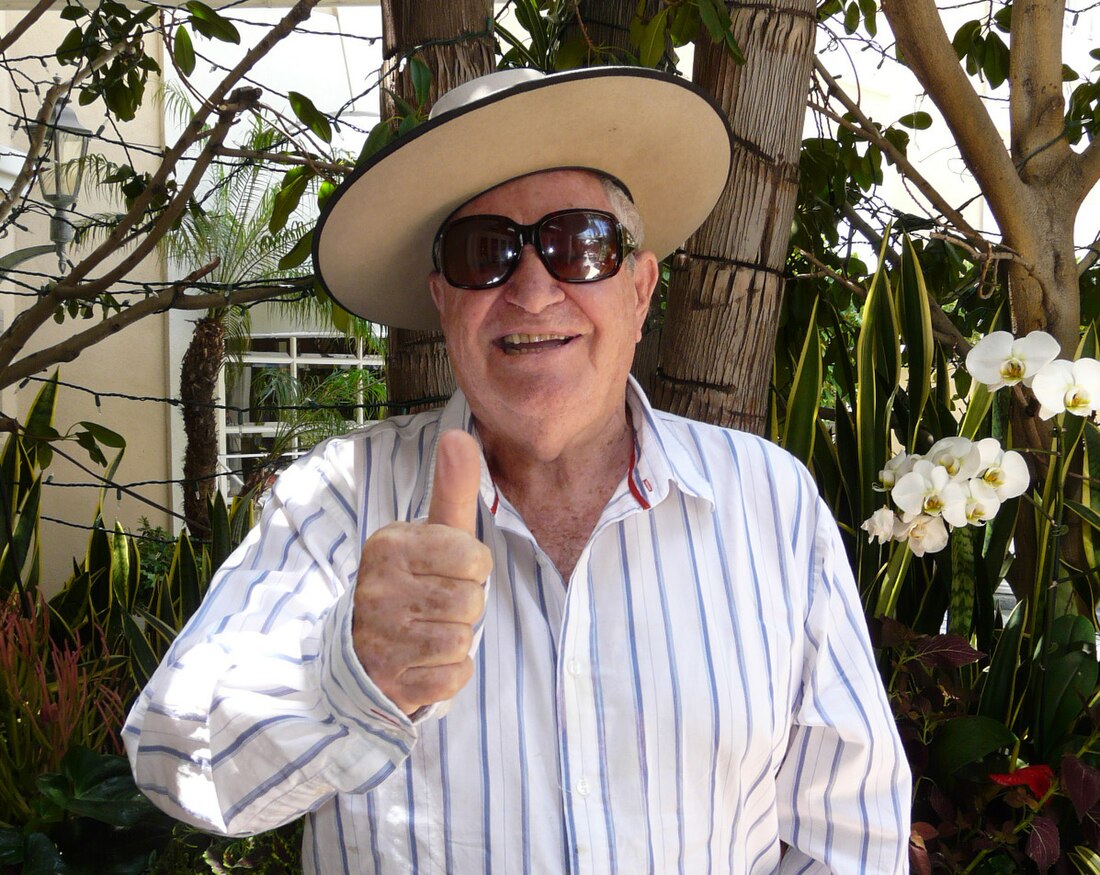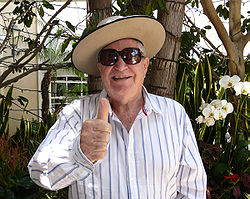Top Qs
Timeline
Chat
Perspective
Menahem Golan
Israeli film director and producer (1929–2014) From Wikipedia, the free encyclopedia
Remove ads
Menahem Golan (Hebrew: מנחם גולן; May 31, 1929 – August 8, 2014, originally Menachem Globus) was an Israeli film producer, screenwriter, and director. He co-owned The Cannon Group with his cousin Yoram Globus. Cannon specialized in producing low-to-mid-budget American films, primarily genre films, during the 1980s after Golan and Globus had achieved significant filmmaking success in Israel during the 1970s.[2]
Golan produced films featuring actors such as Sean Connery, Sylvester Stallone, Chuck Norris, Jean-Claude Van Damme, and Charles Bronson, and for a period, was known as a producer of comic book-style films like Masters of the Universe, Superman IV: The Quest for Peace, Captain America, and his aborted attempt to bring Spider-Man to the silver screen. Golan also wrote and polished numerous film scripts under the pen name Joseph Goldman.[3] At the time of his death, Golan had produced over 200 films, directed 44, and won 8 "Kinor David" awards as well as "Israel Prize" in Cinema. He was nominated for a BAFTA Award for Best Foreign-Language Film for Franco Zeffirelli's Otello.
Remove ads
Early life
Born Menachem Globus[1] in Tiberias in then British Mandate of Palestine (now Israel), his parents were Jewish emigrants from the Russian Empire. He spent his early years in Tiberias, then studied directing at the Old Vic School and the London Academy of Music and Dramatic Art, and filmmaking at New York University. During the Israeli War of Independence, Golan served as a pilot in the Israeli Air Force.
Remove ads
Film career
Summarize
Perspective

Golan started as an apprentice at Habima Theater in Tel Aviv. After completing his studies in theater direction, he staged plays in Israel. He gained experience as a filmmaker by working as an assistant to Roger Corman.[4]
Golan is probably best known as a director for his film Operation Thunderbolt (Mivtsa Yonatan, 1977), about the Israeli raid on Entebbe airport in Uganda. He also produced Eskimo Limon (Lemon Popsicle, 1978), a film that spawned many sequels and an American remake, The Last American Virgin (1982).
An adaptation of the Isaac Bashevis Singer novel The Magician of Lublin (1979) was followed by the musical The Apple (1980). An unusual moral fable with a rock-disco soundtrack, The Apple routinely appears on lists of all-time-worst movies, earning it cult film status.[5]
Golan's production company The Cannon Group produced a long line of films during the 1980s and early 1990s, including Delta Force, Runaway Train, and some of the Death Wish sequels. In 1986, Cannon was taken over by Pathe Communications. Golan produced several comic book-style movies in the last half of the 1980s, most notably Masters of the Universe, based on the Mattel toy line of the same name and inspired by the comics of Jack Kirby.[6] In 1987, Cannon gained infamy after its UK-based production of Superman IV: The Quest for Peace performed poorly at the box office, received mixed to negative reviews from critics and provoked a negative backlash from fans. Golan resigned from Cannon in 1989, and by 1993 the company had folded. After Cannon's collapse, Golan became head of 21st Century Film Corporation and produced several low to medium-budget films.
Golan planned to shoot Spider-Man: The Movie in 1986 at both Elstree Studios in Hertfordshire in the United Kingdom and on location in Tel Aviv, Israel. Dolph Lundgren, who played He-Man in Masters of the Universe was envisioned for the role of the Green Goblin, and Spider-Man co-creator Stan Lee was approached to make a cameo appearance in the film as J. Jonah Jameson.[7] Golan struggled for years to produce the film and finally failed when 21st Century Film Corporation filed for bankruptcy and closed its doors in 1996 (along with Carolco Pictures, another company that had agreed to help finance the film). Sony Pictures eventually purchased the rights to the Marvel Comics character and released a Spider-Man film in 2002, directed by Sam Raimi. That year, Golan released his adaptation of Crime and Punishment.
Remove ads
Personal life
Golan was married to Rachel (1930-2015), a makeup artist. Together, they had three daughters, clinical psychologist and psychoanalyst Ruth Golan (born 1953), Naomi (1958-2015) and Yael (born 1964).[4] His cousin was Israeli-American producer Yoram Globus.[8]
Death
Whilst visiting Jaffa, Tel Aviv, with family members on the morning of August 8, 2014, Golan collapsed.[9] He lost consciousness, and attempts to resuscitate him failed.[9] He was 85 years old.[10]
Filmography
Producer only
Executive producer only
Remove ads
Awards and recognition
- 1978: Nomination for the Academy Award for Best Foreign Language Film Operation Thunderbolt[11]
- 1984: Won the Golden Raspberry Award for Worst Picture Bolero
- 1986: Nomination for Golden Raspberry Award for Worst Picture Cobra
- 1987: Nomination for Golden Raspberry Award for Worst Picture Tough Guys don't dance
- In 1999, Golan was awarded the Israel Prize for his contribution to cinema.[12]
- In 1994 Golan was awarded the Ophir Prize of the Israeli Film Academy for his Lifetime Achievement.
- The movie theater in the Azrieli building in Tel Aviv bore the name of the Golan-Globus company. It was closed in 2008.
Remove ads
See also
References
External links
Wikiwand - on
Seamless Wikipedia browsing. On steroids.
Remove ads

